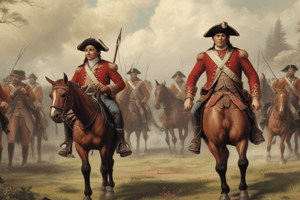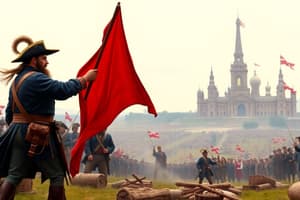Podcast
Questions and Answers
Who was defeated by the British at Fort Duquesne in 1755?
Who was defeated by the British at Fort Duquesne in 1755?
- Jacques Marquette
- Pontiac
- Louis Jolliet
- George Washington (correct)
What was the name of the official announcement that set aside land west of the Appalachian Mountains for Native American groups?
What was the name of the official announcement that set aside land west of the Appalachian Mountains for Native American groups?
- The Stamp Act
- The Proclamation of 1763 (correct)
- The Boston Massacre
- The Townshend Acts
Which city was the largest French settlement in North America?
Which city was the largest French settlement in North America?
- Fort Duquesne
- Montreal
- New Orleans (correct)
- Quebec
What was the name of the group that protested against the Stamp Act?
What was the name of the group that protested against the Stamp Act?
What was the name of the event where British soldiers fired on colonists in Boston?
What was the name of the event where British soldiers fired on colonists in Boston?
What was the name of the act that taxed paper, glass, and paint?
What was the name of the act that taxed paper, glass, and paint?
What happened in response to the passing of the Stamp Act?
What happened in response to the passing of the Stamp Act?
What did the British capture from the French that ended the French and Indian War?
What did the British capture from the French that ended the French and Indian War?
What was the main reason for the shortages faced by Patriot soldiers and Americans during the war?
What was the main reason for the shortages faced by Patriot soldiers and Americans during the war?
What was the practice of charging high prices for goods in short supply known as?
What was the practice of charging high prices for goods in short supply known as?
What caused the Continental currency to lose its value?
What caused the Continental currency to lose its value?
What specific event led to the turning point in the Revolutionary War?
What specific event led to the turning point in the Revolutionary War?
Who was the German military instructor who helped to train the Continental Army?
Who was the German military instructor who helped to train the Continental Army?
Which of these was NOT a major factor in the British loss of the war in the South?
Which of these was NOT a major factor in the British loss of the war in the South?
What was the name of the French naval blockade that contributed to the British defeat at Yorktown?
What was the name of the French naval blockade that contributed to the British defeat at Yorktown?
Which of these events was the most significant factor in convincing France to form an alliance with the Americans?
Which of these events was the most significant factor in convincing France to form an alliance with the Americans?
What event is referred to as the Boston Tea Party?
What event is referred to as the Boston Tea Party?
Who was elected president of the Second Continental Congress?
Who was elected president of the Second Continental Congress?
What critical resource did the Americans run out of during the Battle at Bunker Hill?
What critical resource did the Americans run out of during the Battle at Bunker Hill?
What was the purpose of the Olive Branch Petition sent to King George III?
What was the purpose of the Olive Branch Petition sent to King George III?
Who were the key figures involved in the capture of Fort Ticonderoga?
Who were the key figures involved in the capture of Fort Ticonderoga?
How were supporters of the war referred to during the American Revolution?
How were supporters of the war referred to during the American Revolution?
What year was the Declaration of Independence finalized and signed?
What year was the Declaration of Independence finalized and signed?
What was the main consequence of the Revolutionary War for American Soldiers in the early years?
What was the main consequence of the Revolutionary War for American Soldiers in the early years?
Flashcards
Boston Tea Party
Boston Tea Party
A political protest on December 16, 1773, where colonists disguised as Native Americans dumped tea into Boston Harbor.
First Continental Congress
First Continental Congress
Meeting of colonial delegates in Philadelphia to address 'The Intolerable Acts.'
Midnight Ride
Midnight Ride
The event where Paul Revere and others warned colonists the British were coming before Lexington.
Fort Ticonderoga Capture
Fort Ticonderoga Capture
Signup and view all the flashcards
Battle of Bunker Hill
Battle of Bunker Hill
Signup and view all the flashcards
Second Continental Congress
Second Continental Congress
Signup and view all the flashcards
Declaration of Independence
Declaration of Independence
Signup and view all the flashcards
Patriots
Patriots
Signup and view all the flashcards
Marquette and Jolliet
Marquette and Jolliet
Signup and view all the flashcards
Tributary
Tributary
Signup and view all the flashcards
Fort Duquesne
Fort Duquesne
Signup and view all the flashcards
French and Indian War
French and Indian War
Signup and view all the flashcards
Proclamation of 1763
Proclamation of 1763
Signup and view all the flashcards
Stamp Act
Stamp Act
Signup and view all the flashcards
Boston Massacre
Boston Massacre
Signup and view all the flashcards
Tea Act
Tea Act
Signup and view all the flashcards
Women supporting the war
Women supporting the war
Signup and view all the flashcards
Patriot soldier shortages
Patriot soldier shortages
Signup and view all the flashcards
Price gouging
Price gouging
Signup and view all the flashcards
Continental currency problems
Continental currency problems
Signup and view all the flashcards
Desertion in the army
Desertion in the army
Signup and view all the flashcards
Battle of Saratoga
Battle of Saratoga
Signup and view all the flashcards
Treaty with France
Treaty with France
Signup and view all the flashcards
Winter at Valley Forge
Winter at Valley Forge
Signup and view all the flashcards
Study Notes
Unit 4 Study Guide - Key Facts
- Jacques Marquette and Louis Jolliet were the first to explore the Mississippi River.
- A river or stream that flows into a larger river is called a tributary.
- An explorer and his men built a fort (at present-day location) and claimed the territory, naming it.
- New Orleans' founding marked the largest French settlement.
- Colonists in Louisiana built and raised enslaved people.
- Disagreement over land in the Ohio River Valley between France and Great Britain led to conflict.
- The British defeated the French at Fort Duquesne, though they did not capture the fort.
- The British were defeated at Fort Dequesne in 1755, and a person was killed.
- The British captured Fort Dequesne in 1758 with help.
- The French and Indian War ended when the British captured Canada.
- A proclamation officially set aside land west of the Appalachian Mountains for Native Americans.
- The Ottawa Chief united Native Americans to drive out the British but was defeated by the British army in a battle.
- To pay for the war, the British government raised taxes on the colonists.
- Angry colonists protested taxes, refusing to buy goods or services, and formed a united front.
- Parliament voted to repeal/end the Stamp Act (taxing paper, glass and paint) in 1766.
- The Boston Massacre (colonists protesting British authority) happened on March 6, 1770, leading to the death of colonists.
- Colonists gathered in Boston to protest the taxes.
- The British passed the Intolerable Acts in 1773.
- The Boston Tea Party occurred on Dec. 16, 1773, when colonists disguised themselves and dumped tea into the harbor.
- Representatives met in Philadelphia to discuss the Intolerable Acts.
- British soldiers were sent to Lexington on April 18, 1775 to arrest colonists.
- The British won the Battle at Bunker Hill because Americans ran out of supplies.
- A person was elected president of the Second Continental Congress, and soon realized delegates had different goals.
- In July 1775, the Congress sent a message to King George III, worsening relations and sparking more fighting.
- Congress raised funds to fight the British in 1775.
- A person, the leader of the army, was named by Congress to fight the British.
- A committee was assigned to compose the Declaration of Independence.
- The final version of the Declaration was signed in.
- Details about the number of delegates signing the Declaration are missing in the document.
- Americans who supported the war were called Patriots.
- American soldiers faced shortages in the early years of the Revolution due to various problems.
- The Revolutionary War lasted a certain period of time.
- British and American army strengths and weaknesses are unspecified in the provided information.
- Missing information on how women supported the war effort.
- Farmers and merchants prospered by hoarding goods and charging high prices.
- Congress printed excessive paper money, losing value for the currency.
- Soldiers like Thomas Paine experienced despair and left the army because of the lack of victory hope.
- Washington surprisingly crossed the Delaware River, surprising the British at Trenton, and the Patriots defeated the British.
- The turning point of the war occurred on October 17, 1777.
- The French were convinced by Patriot victory to support America's independence.
- Washington and his army endured a harsh winter in 1777.
- The American military instructor arrived from Germany to train the soldiers.
- Patriot troops gained control of the South with support.
- British troops under Cornwallis initially won battles but faced losses later on.
- The British loss in the Revolutionary War occurred at Yorktown.
- French assistance in the war was critical.
- Cornwallis' army surrendered to Washington.
- The results of the war are not elaborated on here.
Studying That Suits You
Use AI to generate personalized quizzes and flashcards to suit your learning preferences.




